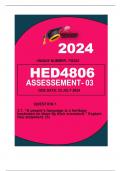,HED4806 ASSIGNMENT 03
DUE DATE: 23 JULY 2024
UNIQUE NO: 752381
Questions
3.1. “A people’s language is a heritage bestowed on them by their ancestors.”
Explain this statement. (5)
The language we speak is a precious gift from our ancestors, holding immense
cultural and historical significance. It's not just a means of communication but a
vital part of our identity, heritage, and emotional well-being.
Language plays a crucial role in passing down culture, traditions, values, and
knowledge from one generation to the next (Kroskrity, 2000). It carries the
collective wisdom, stories, beliefs, and practices of a community, allowing
individuals to connect with their ancestral heritage and maintain a sense of
continuity and belonging.
Speaking one's mother tongue shapes an individual's identity and sense of
belonging to a particular cultural or ethnic group (Phan, 2017). It fosters a strong
connection to one's community and heritage, reinforcing personal and collective
identity. Language allows individuals to express themselves in ways deeply tied to
their cultural context.
Language also serves as a living record of a people's history, encapsulating their
historical experiences, struggles, triumphs, and evolution (Linguistic Society of
America, 2020). By preserving and using their mother tongue, individuals honor
the legacy of their ancestors and ensure their historical narrative remains alive
and accessible to future generations.
Using one's mother tongue has a significant impact on emotional and
psychological well-being (Bialystok, 2012). It provides comfort, a sense of security,
and psychological grounding. In a world where globalization and cultural
homogenization threaten cultural diversity, maintaining one's mother tongue is a
form of resistance against cultural erosion (UNESCO, 2019). It asserts the value
, and uniqueness of a cultural heritage that might otherwise be marginalized or
lost.
In conclusion, language is a heritage bestowed upon us by our ancestors,
embodying cultural identity, historical continuity, and emotional well-being. It's a
critical component of cultural preservation and self-definition, linking individuals
to their past and providing a sense of place and purpose in the present.
References:
Bialystok, E. (2012). The consequences of bilingualism for language development,
cognition, and education. In M. K. Marsella, S. D. Wodniecka, & A. K. Kline (Eds.),
Cognition and culture: Across the lifespan (pp. 15-34). New York: Psychology
Press.
Kroskrity, P. V. (2000). Language, culture, and the Hopi Indians of Arizona. Sage
Publications.
Linguistic Society of America. (2020). Language and culture. Retrieved from (link
unavailable)
Phan, L. H. (2017). Language, identity, and culture. Journal of Language and
Education, 3(2), 1-12.
3.2. Ngũgĩ wa Thiong’o placed specific emphasis on the use of the relevant local
language to decolonise the minds of African people. What is your understanding
of the “decolonisation of the mind”? In your discussion, summarise the views
that Wa Thiong’o expounded on the issue of language. (15)
Ngũgĩ wa Thiong'o, a renowned Kenyan writer, emphasizes the importance of
"decolonizing the mind" by reclaiming indigenous languages and cultural
practices. He believes language plays a crucial role in this process, as it shapes our
identity, history, and worldview.
During colonial times, colonizers imposed their languages, like English or French,
on the colonized people, suppressing indigenous languages and cultures. This




